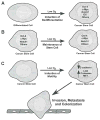Metastasis and stem cell pathways
- PMID: 17647111
- PMCID: PMC3215288
- DOI: 10.1007/s10555-007-9053-3
Metastasis and stem cell pathways
Abstract
Recent studies have described a small population of self-renewing and multipotent cells within tumors termed "cancer stem cells." These cells share many traits with somatic and embryonic stem cells and are thought to be responsible for driving tumor progression in a growing list of neoplastic diseases. Cells within solid tumors encounter hypoxia due to poor vascular function. Both long-standing and emerging data describe hypoxic effects on somatic and embryonic stem cells, and it is likely that hypoxia also has profound effects on cancer stem cells. These effects include the activation of pathways that induce the dedifferentiation of cancer cells, the maintenance of stem cell identity, and increased metastatic potential. Hypoxia may contribute to tumor progression by specifically impacting these pathways in cancer stem cells.
Figures


References
-
- Carmeliet P, Jain RK. Angiogenesis in cancer and other diseases. Nature. 2000;407:249–257. - PubMed
-
- Pouyssegur J, Dayan F, Mazure NM. Hypoxia signalling in cancer and approaches to enforce tumour regression. Nature. 2006;441:437–443. - PubMed
-
- Brown JM, Wilson WR. Exploiting tumour hypoxia in cancer treatment. Nat Rev Cancer. 2004;4:437–447. - PubMed
-
- Hockel M, Vaupel P. Tumor hypoxia: definitions and current clinical, biologic, and molecular aspects. J Natl Cancer Inst. 2001;93:266–276. - PubMed
-
- Graeber TG, Osmanian C, Jacks T, Housman DE, Koch CJ, Lowe SW, Giaccia AJ. Hypoxia-mediated selection of cells with diminished apoptotic potential in solid tumours. Nature. 1996;379:88–91. - PubMed
Publication types
MeSH terms
Substances
Grants and funding
LinkOut - more resources
Full Text Sources
Medical

